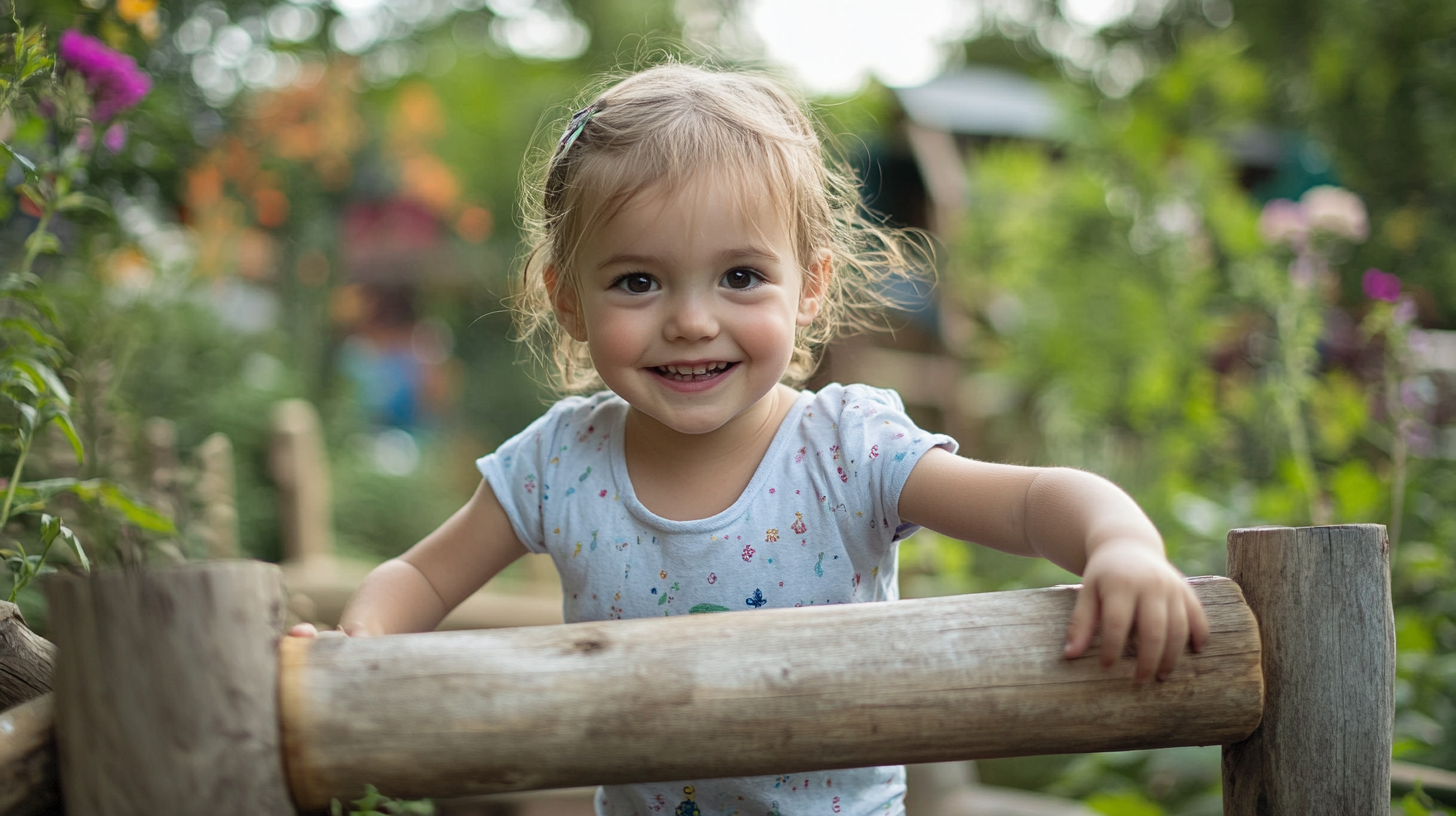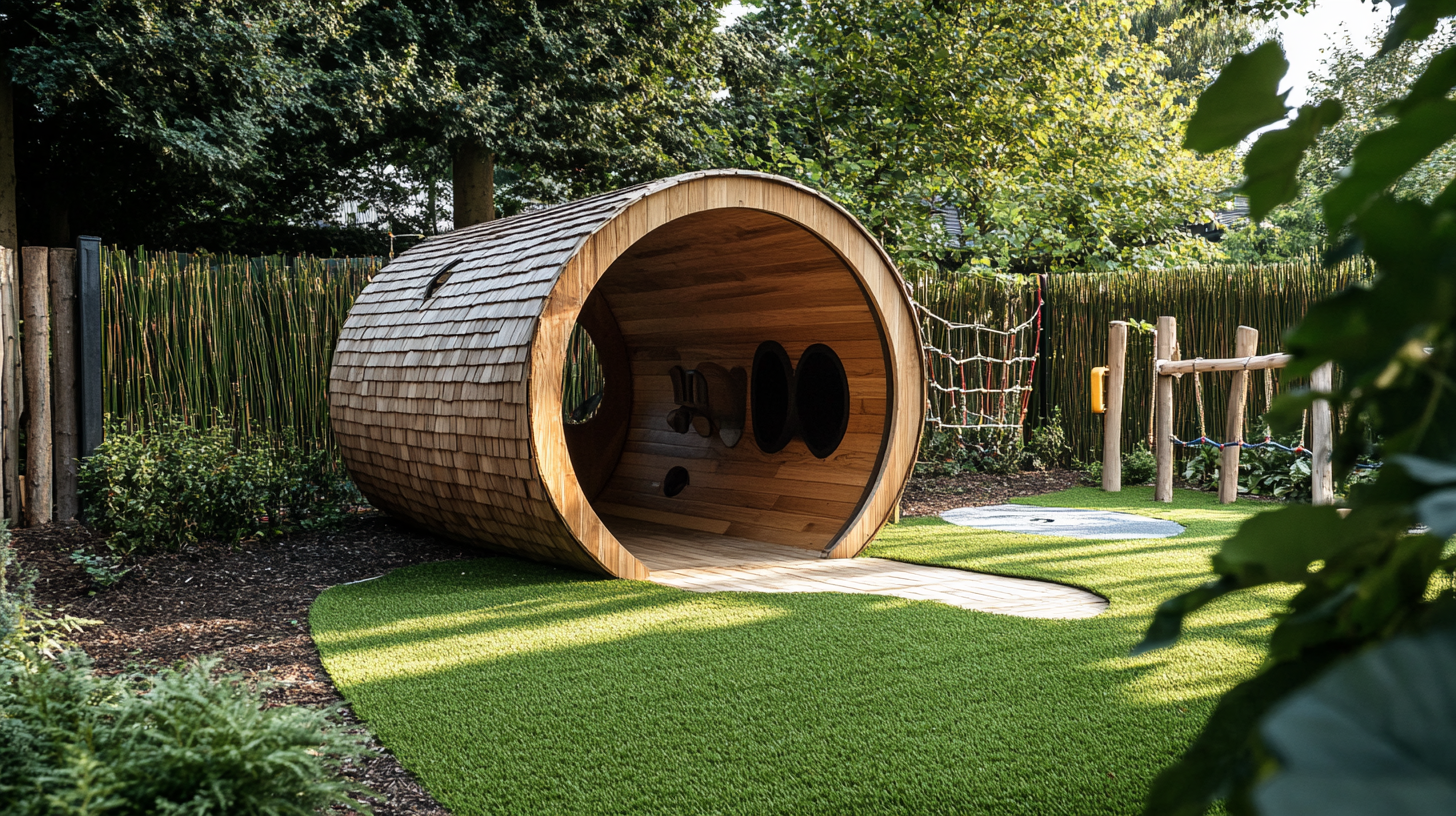As early childhood development experts increasingly emphasize the importance of outdoor play, the significance of Garden Playing Equipment in fostering children's growth cannot be overstated. According to a report by the American Academy of Pediatrics, children aged 2 to 5 should get at least three hours of physical activity each day, which can significantly enhance their physical, cognitive, and emotional health. The role of garden play spaces equipped with suitable playing equipment has proven instrumental in achieving these goals, encouraging active engagement with the environment while promoting essential skills such as teamwork and problem-solving.
Moreover, research from the National Association for the Education of Young Children highlights that children who engage with outdoor playing equipment often display improved creativity and social skills. These play settings not only provide a safe area for physical activity but also stimulate imaginative play, which is crucial for healthy brain development. As parents and educators seek ways to enrich children's play experiences, the benefits of incorporating Garden Playing Equipment into outdoor environments are becoming clearer, illustrating its importance in nurturing well-rounded, resilient children.

Garden playing equipment plays a vital role in enhancing children's physical development. Outdoor play structures, such as swings, slides, and climbing frames, encourage children to engage in diverse physical activities that promote strength, coordination, and agility. These dynamic activities not only improve their motor skills but also increase their endurance and overall physical fitness. When children navigate through various play equipment, they develop essential skills like balance and spatial awareness, which are crucial for their long-term physical capabilities.
In addition to refining motor skills, garden playing equipment also fosters cognitive abilities through physical challenges. As children climb or swing, they assess risks and make decisions, enhancing their problem-solving skills. This interaction with their environment leads to an understanding of cause and effect as they experiment with different movements and techniques. Furthermore, outdoor play in a garden setting promotes social interaction, as children often collaborate or compete with peers, which cultivates teamwork and communication skills—important aspects of holistic development.
Ultimately, investing in garden playing equipment creates a stimulating environment where children can thrive physically and cognitively. This combination of active play and social engagement not only supports their current health but also lays the foundation for a lifelong appreciation of physical activity and outdoor exploration.

Outdoor play is an essential component of childhood development, particularly in fostering creativity and imagination. According to the American Academy of Pediatrics, unstructured playtime allows children to explore their surroundings, engage in imaginative scenarios, and develop problem-solving skills—key elements that shape their cognitive abilities. Garden playing equipment, such as climbing frames, swings, and sandbox areas, provides the perfect environment for this type of play.
Engaging with nature and outdoor play equipment encourages children to express themselves in novel ways. In a study published by the Journal of Play, researchers found that when children interact with nature, their imaginative capabilities are significantly enhanced. They tend to create stories and scenarios that reflect the world around them, boosting their linguistic and social skills. The vibrant, ever-changing garden setting sparks their curiosity, enabling them to invent games and role-play that contribute to their emotional and social development.
Furthermore, children who have access to well-designed outdoor play spaces are likelier to exhibit higher levels of creativity. The organization Nature Play Community reports that specific garden arrangements and play equipment can significantly affect children's mood and behavior, resulting in more prolonged and deeper engagement during playtime. This investment in outdoor play environments is vital for fostering a generation of innovative thinkers equipped to solve the challenges of tomorrow. By encouraging children to immerse themselves in creative outdoor play, we pave the way for their holistic development and well-being.

Garden play structures offer more than just an avenue for fun; they serve as vital tools for fostering social skills and friendships among children. In an age where traditional playgrounds are disappearing, garden play areas provide essential opportunities for kids to interact, collaborate, and build relationships. Through games and shared experiences, children learn critical social dynamics such as teamwork, communication, and conflict resolution. Whether it's negotiating roles in play or simply sharing space, these interactions are invaluable for their social development.
Furthermore, the rising acknowledgment of the importance of play in child development highlights that engaging in physical activity isn't merely about exercise; it's about cultivating essential life skills. Innovative play structures encourage children to take turns and support one another, enabling them to forge friendships based on trust and mutual respect. Given that many urban areas are losing accessible playgrounds, investing in community garden play equipment is crucial for ensuring that children have the resources they need to thrive socially and emotionally.
In this fast-paced world, where many resources for play are diminishing, creating safe and engaging garden play environments is necessary. These spaces allow children to explore their surroundings and connect with peers, fostering a sense of belonging. As communities recognize the importance of these play structures, they can help counteract the decline in play opportunities, ensuring children not only enjoy themselves but also grow into well-rounded individuals.
In a world dominated by screens and digital distractions, garden playing equipment offers a refreshing alternative that fosters cognitive development in children. These natural play environments provide an opportunity for children to engage in unstructured play, which is fundamental for enhancing creative thinking and problem-solving skills. When children climb, balance, and navigate through various garden structures, they are not merely exercising their bodies; they are also stimulating their minds.
Outdoor play encourages exploration and experimentation. For instance, as children figure out how to balance on a beam or conquer a climbing structure, they develop spatial awareness and critical thinking skills. Each challenge they encounter—whether it's deciding the best route up a climbing wall or exploring the properties of sand and water—promotes cognitive flexibility, enabling them to come up with multiple solutions to problems. This inherent learning process is crucial for their intellectual growth, providing context to abstract concepts as they experience cause and effect firsthand.
Moreover, garden play settings help cultivate social skills as children interact with peers in a collaborative environment. Whether they are figuring out the rules of a game or negotiating how to share equipment, these interpersonal exchanges require effective communication and teamwork. As they work together, children learn to respect others’ ideas while also asserting their own, further enhancing their cognitive abilities and equipping them with essential life skills. Through such dynamic interactions in nature, children not only enjoy physical activity but also engage in profound cognitive and social development.
Engaging in outdoor play with garden equipment not only fosters physical development in children but significantly contributes to their emotional well-being and resilience. Research indicates that outdoor activities promote a sense of community and connectedness, which are vital for mental health. As children interact with their peers while climbing, swinging, and exploring, they build essential social skills that lay the foundation for emotional resilience. This is crucial as emotionally resilient children can cope better with challenges and stress, enhancing their overall quality of life.
Furthermore, similar to findings in adult populations regarding mind–body exercises, children also benefit from activities that connect them with nature and their peers. A study published in the Journal of Environmental Psychology reported that children who regularly engage in outdoor play exhibit higher levels of perceived social support, which is directly linked to greater emotional stability. The correlation is strong: children who feel supported are more likely to develop coping mechanisms that aid in dealing with life’s challenges.
Moreover, incorporating garden play equipment can facilitate mindfulness in young ones, promoting a sense of presence and awareness, akin to benefits observed in older adults practicing mind–body exercises. By allowing children to immerse themselves in their surroundings and engage physically, we are essentially enabling the development of vital emotional skills. Hence, outdoor garden playing equipment plays a crucial role in nurturing well-rounded, resilient individuals who are better equipped to face the complexities of life.
